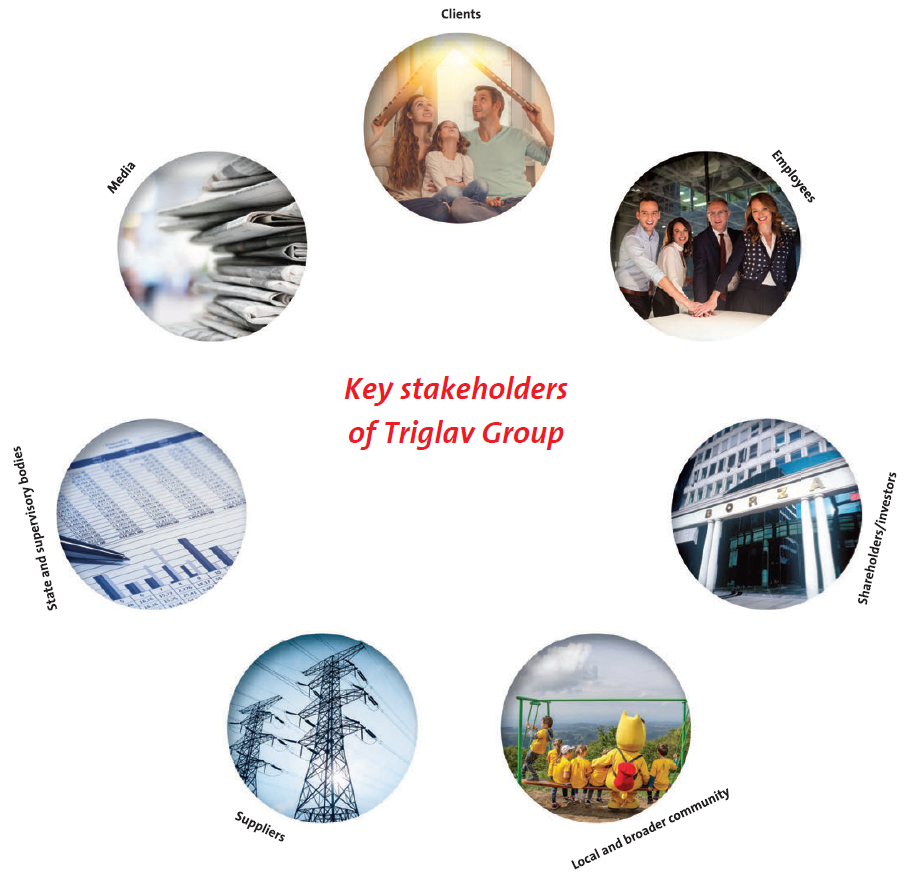The Triglav Group builds its reputation through quality relationships with its key stakeholders. It measures its business performance with the central indicators of its sustainable development, and, through their improvement, pursues its strategic guidelines for 2022.
The ESG factors (Environment, Social, Governance) are managed through GRI (Global Reporting Initiative) standards and the achievement of the United Nations Global Sustainable Development Goals (SDGs). The central topics for the Triglav Group and its stakeholders are presented below.
Material topics of sustainable development of the Triglav Group and Zavarovalnica Triglav
Economic aspects
| - Economic performance
- Market presence
- Indirect economic impacts
| - Procurement practices
- Protection of competition
- Anti-corruption behaviour
|
Social aspects
| - Employment
- Relationships between the employees and the management
- Occupational health and safety
- Education and training
- Diversity and equal opportunity
- Labour practices grievance mechanisms
- Local communities
| - Non-discrimination
- User privacy
- Grievance mechanisms on human rights policies or procedures
- Supplier social assessment
- Marketing and labelling
- Product and service portfolio
- Socioeconomic compliance area
|
Environmental aspects
| - Energy
- Supplier environmental assessment
| |
Achievement of United Nations Sustainable Development Goals (SDGs)

Management of ESG factors
| Area
| Activities
|
Environment
| - Carbon footprint reduction
- Introduction of paperless operations
- Activities for a cleaner environment
- Promotion of extensive farming
- Reduction and separation collection of waste
| - Reduction of electricity consumption by 3% and carbon footprint by 6% at Zavarovalnica Triglav
- Electric vehicles account for 11% of Zavarovalnica Triglav's vehicle fleet; employees may use company bikes and electric scooters
- 10 years of Slovenia-wide “Let’s Clean the Mountains” drive
|
Social
| - Net promoter score (NPS)
- Preventive activities aimed at reducing risks in the social environment
- Responsibility to the clients
- Responsibility to the employees
- Support for sports, culture, education and health
| - Global client assistance 24/7
- DRAJV application to promote safe driving
- Investing in pension funds, health insurance and health systems
- 24 light signalling systems for preventing collisions on unprotected railway level crossings over two years and 56 speed display signs in local communities, at high-risk road sections, and in the vicinity of schools and kindergartens (4 years)
- Support to young hopes
- ORVI index at 3.88 in 2019
|
Governance
| - Stable and profitable operations
- High standards of corporate governance
- Effective risk management
- Active investor relations management policy
- Fair business practices
| - Corporate Governance Code for Companies with Capital Assets of the State
- Triglav Group Code
- Anti-corruption activities
- Protection of competition
- Insurance fraud detection and management
- Business respect for human rights
|
Key stakeholders of Triglav Group
 Mutual trust and understanding are strengthened by proactively engaging individual stakeholder groups. The Company monitors the needs and interests of its stakeholders through a mix of mutual relationships at the strategic and operational levels.
Mutual trust and understanding are strengthened by proactively engaging individual stakeholder groups. The Company monitors the needs and interests of its stakeholders through a mix of mutual relationships at the strategic and operational levels.
A stakeholder analysis and a materiality analysis of stakeholder content were conducted for the second time in 2019, and for the first time in 2017. In order to identify employees’ interests, a survey in the form of two focus groups was conducted, as well as in-depth interviews with clients. The interests of investors or shareholders were monitored through personal contact and questions at investor conferences and the General Meeting of Shareholders. As part of the analysis, stakeholders were asked to prioritise their interests or influences that individual factors have on their decisions, and based on that, a matrix of interests was prepared. Individual topics were divided into three strategic sets: long-term business stability, client focus, and a culture of openness and corporate social responsibility.
Importance of content for stakeholders and the Triglav Group


 Mutual trust and understanding are strengthened by proactively engaging individual stakeholder groups. The Company monitors the needs and interests of its stakeholders through a mix of mutual relationships at the strategic and operational levels.
Mutual trust and understanding are strengthened by proactively engaging individual stakeholder groups. The Company monitors the needs and interests of its stakeholders through a mix of mutual relationships at the strategic and operational levels.

